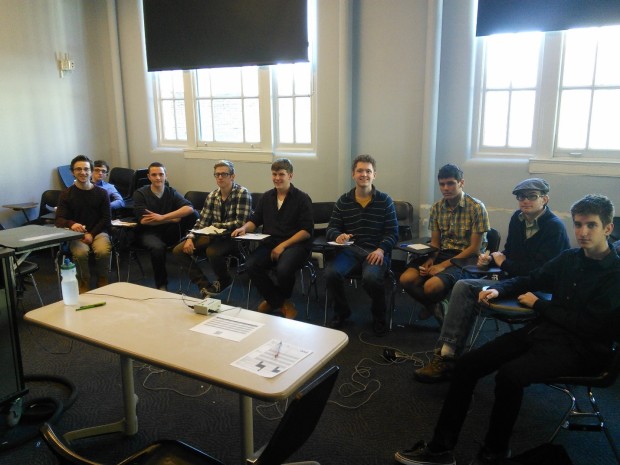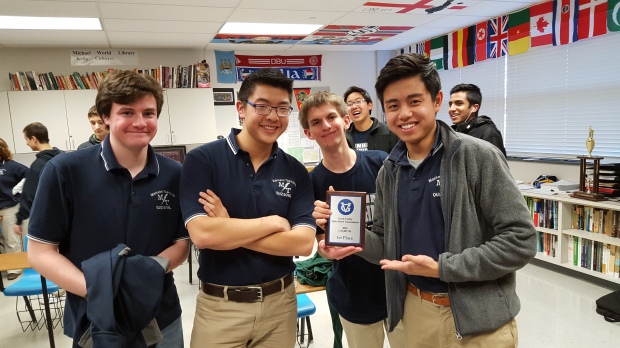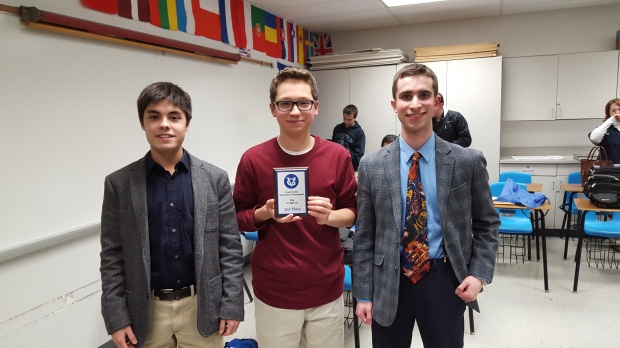Summer is here, but it’s time to start planning next year’s tournaments! Here’s a guide to getting in touch with teams when you’re hosting a tournament:
One of the most basic questions that teams face when they host a quizbowl tournament is how to get in touch with other schools to invite them to said tournament. While posting a tournament announcement on the HSQB forums and getting your tournament on the GPQB regional schedule are good starting points, you need to invite teams directly as well.
In a few areas of the country, paper invitations mailed to schools are still the standard method of communicating about tournaments. Based on the results of randomly-assigned contact methods that I tried last year, however, in Pennsylvania, Delaware, and New Jersey email seems to be by far more effective than snail mail in getting a response. So how do you write a good email invitation to a quizbowl tournament?
Personalize Your Invitations. Ideally, the invitation email should be personalized. This helps get past spam filters and immediate deletions; people are just more likely to read an email actually addressed to them than a generic “Dear Coaches” or “To all quizbowl coaches” mass BCC email. Yes, this takes a bit more work, but not that much and the higher response rate that it generates is well worth the effort.
Keep It Short! You want your email to be short and to the point rather than a mass of text. Avoid as much quizbowl jargon and acronyms as possible (remember Strunk and White) and use links judiciously to provide an opportunity for interested recipients to look up more information on their own. Your initial goal is to get a response if people are interested in the general idea of the tournament, at which point you can then provide more information. Educators get dozens of pieces of email every day; you want your invitation to be easily read and understood by your recipient.
Consider Your Audience. A principal at a school that has never played quizbowl before is a very different audience from a quizbowl coach of a team that regularly plays many pyramidal tournaments. There are also some coaches at schools who play local non-pyramidal tournaments and may never have had direct contact with the broader quizbowl circuit before. Figure out which type of school you’re emailing for each and generate a general template for each type that you can then personalize. For instance, if the school calls their team a “Knowledge Bowl” or “Academic Challenge” team, be sure to use that language in the email.
How to Find Contact Information. To get email addresses, I always recommend using school websites. While some websites are more functional than others, you can usually find a list of activities/extracurriculars with sponsors as well as a faculty directory to match up the name of the sponsor with an email. If you can’t find a current team or sponsor, you can try emailing the director of student activities (if the school has one), the vice-principal or dean in charge of student activities (if they have one listed), or just the principal or head of school. NAQT also has a listing of some coaches and contacts for teams that you can search within, although they might not be current since sponsors often vary from year to year. You might also ask other tournament hosts in your area very, very nicely for their contact lists from previous years.
Quizbowl Tournament Invitation Email Templates
Below, I’ve provided some examples of tournament invitation emails that got solid results in the past. “Solid results” doesn’t mean that all of them got responses; I’d say my overall response rate has been about 20%, but that’s still fairly high, so don’t be discouraged if you only get a few replies to your invites initially. You should feel free to modify these templates as you see fit with local traditions, such as different local terms for quizbowl like “Academic Challenge,” “Knowledge Bowl,” “Brain Bowl,” etc.
Invitation to a school without a quizbowl team:
Dear ___[Contact Person; use “Dr.” or “Principal” as needed]____,
The __[Your Team’s Name]______ Quizbowl Team would like to invite ___[Invitee]__ to compete at our ___[Tournament Name]_____, a quizbowl tournament to be held at __[location]__ on _[date]__.
Quizbowl is a team-based academic knowledge competition that’s a bit like a team version of Jeopardy! with more academically rigorous questions. The topics asked about encompass the whole of the high school curriculum from literature, history, and science to fine arts, the social sciences, and mythology. To get an idea of what quizbowl questions are like, see a brief explanation here and some sample packets of questions here.
The tournament should last from approximately ______ to _______ with a break for lunch; more logistical details will be sent closer to the tournament for teams who register. A list of teams registered and other logistical details will be updated ______[link to your tournament on the HSQB forums]______.
Let us know if you think ____[Invited School’s]____ students might be interested in competing. We enjoy seeing new schools experience quizbowl for the first time and we’d be happy to work with a faculty sponsor and/or interested students to help get a quizbowl team started.
Sincerely,
-_____[Your Name]______
Tournament Director, ___[Your Tournament]____
One thing that I particularly like about this template is that it can be targeted to a principal or a head of school, but it subtly suggests at the end that the principal should delegate responsibility to a teacher or student. Principals are a good point of contact, but they rarely actually sponsor teams, so you want the principal to forward the email out to the faculty members to increase your pool of potential sponsors. This works even better if the principal directly asks for a volunteer to start a team.
You might even want to make this “help start a team” part of the email more direct, especially at the start of a school year when schools are deciding on extracurriculars for the year. Note that these emails to schools without a quizbowl team are probably the most effective just before or right at the start of a school year; most schools will not start a new club late in the school year, although you can still try to get an existing team to come.
Here’s a sample invitation for a team that has a quizbowl-like team, but only plays in a local league or on a local TV tournament. To get an idea of what they call their team (common variations on quizbowl in PA include Scholastic Scrimmage, Academic Competition, Academic Challenge, Academic Bowl), check out the school’s website first.
Invitation to a school with a team, but not a regular quizbowl attendee:
Dear ___[Contact Name]___,
The ____[Your School’s Club]____ Quizbowl Team would like to invite ___[Invited School]____’s ____[Name of the Format or TV Show]____ team to compete at our ____[Tournament Name]_____, a quizbowl tournament to be held at __[location]___ on ___[date]___.
Quizbowl is similar to _____[Name of the Format or TV Show]___ in testing academic knowledge and using a buzzer-based format, so our tournament would likely be useful preparation for _____[Name of the Format or TV Show]____. You can read more about the style of questions that we will be using at our tournament here. Our tournament will also be a qualifier for ___[insert national championship(s) as needed here; usually every tournament can be a PACE qualifier, but only tournaments on NAQT questions can be direct NAQT qualifiers]______.
The tournament will begin at approximately __[start time]_ and last until about ___[expected end time]___ with a lunch break. All teams will be guaranteed at least __[total number of]___ games, including ___[games in the rebracketed playoffs]___ against opponents of similar ability. For additional logistical details, please see our post ____[link to HSQB forum post]_____.
Let us know if we can answer any questions about our tournament or the world of quizbowl in general. We’d love to see ___[Invited School]____ at our tournament in ____[month]____!
Sincerely,
-_____[Your Name]______
Tournament Director, ___[Your Tournament]____
This letter does several things: it makes it clear that you know a bit about their school already by correctly calling their team by the name that they use and are familiar with. It provides more specific logistical details compared to a new-to-quizbowl school (whom you don’t want to overwhelm with too much info in the initial email) to give contacts an idea of what to expect at a weekend pyramidal tournament. It ties into the local format by portraying your tournament as a practice opportunity to improve on that, which is what those coaches tend to initially value the most. And it mentions the wider world of quizbowl by mentioning the national championships (although if your tournament is a novice-only tournament or has a novice-only division, those are usually not national qualifiers, so don’t say that!).
You can also congratulate the school if you found that they won their local tournament or won their last TV match or something similar; it’s a nice gesture that shows you paid attention and again might catch the eye of an otherwise skeptical sponsor.
Invitations to regular quizbowl attendees are a bit easier to write so I won’t provide a template here, but be sure to provide the standard Who/What/When/Where and especially what question set you’re using. Regular attendees are also likely more interested in the format that you’ll be using, the rules for determining final placement, and who will get awards. You can usually save those specifics for a later email closer to the tournament date, but you should remember to send ’em out before the tournament at some point.
Again, these are just templates; feel free to modify them as you might need them for your area. But they seem to have worked in the past for us and hopefully they’ll do the same for you. You can also adapt this to a snail-mail invitation fairly easily. Just include say, a regional tournament schedule or more information about quizbowl on the back of the paper letter as well as your email address. Good luck hosting!


